
Coast Guards assist in controlling fire on board two whale watching boats
Sri Lanka Coast Guards in a joint operation with the Fire Brigade of the Matara Municipal Council controlled the spread of a fire that broke out onboard two whale watching boats ‘Speed Liner’ and ‘Deep Blue’ owned by Ceylon Speed Liner Pvt. Ltd at the Fisheries Harbour in Mirissa during the weekend, local media reported.
Sri Lanka Coast Guard and the emergency platoon of the Sri Lanka Coast Guard Rohana, swiftly rushed to the location where the fire initially erupted and engaged in a fire extinguishing mission
Source – 18/04/2017, Times Online , See more at – http://www.sundaytimes.lk/article/1020116/coast-guards-assist-in-controlling-fire-on-board-two-whale-watching-boats
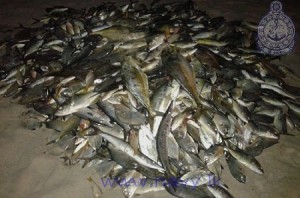
13 local fishermen held for illegal fishing
Naval personnel attached to Eastern Command yesterday arrested 13 local fishermen who engaged in illegal fishing with banned nets in the seas off Koduwakattumalai in Pulmudai, Navy said.
During the arrest, 3 dinghy boats, a banned fishing net, 350 kg of fish were taken into naval custody. The arrested suspects along with seized belongings were handed over to the Kuchchaweli police for further investigations.
Source – 18/04/2017,Tmes Online, see more at – http://www.sundaytimes.lk/article/1020130/13-local-fishermen-held-for-illegal-fishing-2
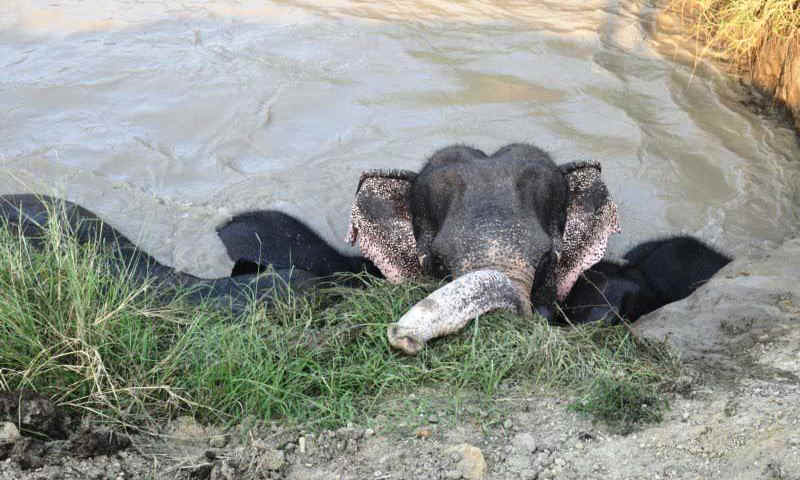
Image courtesy: AdaDerana
Two elephants and two baby elephants that fell into a well in a paddy field in Kombuvaittakulam, Omanthai, Vavuniya, were rescued. They had been searching for water yesterday (16th April) when the accident happened.
The two calves were rescued yesterday, but the older elephants proved to be harder to rescue since it was impossible to bring a backhoe to the area.
Wildlife Officials arrived on the scene as well. The two remaining elephants were rescued today morning.
The Omanthai Police are conducting investigations.
Source – 17/04/2017, Front Page, See more at – http://www.frontpage.lk/page/4-Elephants-that-fell-into-well-in-Vavuniya-rescued/19942
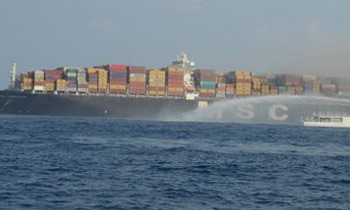
Fire in container ship: Threat to environment: MEPA
The Chemical substance container carrying ship ‘MSC Daniela”, which caught fire on April 4 was still remained a threat to the environment as the fire was not hundred percent doused, Marine Environment Protection Authority (MEPA) General Manager Dr. Turny Pradeep Kumara said.
On April 4, the Maritime Rescue Coordinating Centre (MRCC) Colombo, had received a fire distress call from the local agent of ‘MSC Daniela’ as the vessel was 120 Nm off Colombo.
The Indian Coast Guard threw its weight behind the Sri Lanka Navy and Air Force to douse the fire onboard container carrier “MSC Daniela” off the Colombo port. In addition, the Indian Navy had also directed two of their ships INS ‘Darshak’ and INS ‘Garriel’ to the location.
Dr. Turny Pradeep Kumara revealed this information at a media briefing held in Matara on Saturday. The fire erupted when it was passing Indian Ocean in the close vicinity of Sri Lanka and it was transporting 11,000 containers across Indian Ocean when this mishap occurred. “During night harmful particles are flown towards land with the inter monsoon wind now prevailing,” the General Manager said.
It has been decided during the media briefing to launch an investigation under the Secretary of Mahaweli Development and Environmental Ministry Udaya R. Senevirathna and Chairman of Marine Environment Protection Authority retired Rear Admiral Rohana Perera, he said. (R.G. Jayawardena) – See more
Source – 17/04/2017,Dailymirror, See more at: http://www.dailymirror.lk/article/Fire-in-container-ship-Threat-to-environment-MEPA-127274.html#sthash.rBb2hqv3.dpuf
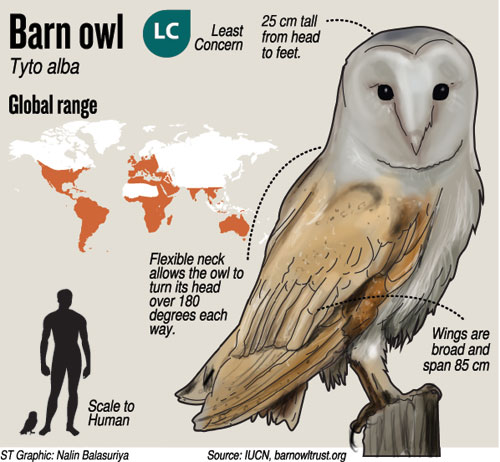
Urban excitement over barn owls
By Malaka Rodrigo
The barn owl is a rare bird in Sri Lanka categorized as ‘near threatened’ in the 2012 National Red List, but it wasn’t an April Fool’s joke that one was seen in Kirulapona on April 1.
It had been attacked by crows and had fallen from the roof of a four-storey building, where it had taken refuge. It was handed over to wildlife expert Shantha Jayaweera who later released it. “Even through it had been attacked by crows, there were no external injuries.”
The barn owl (tyto alba) is a beautiful owl species with a whitish face, chest, and belly, and buffy upper parts. Its scientific name means, ‘white owl’.
Barn owls have adapted to living among humans. Granaries, warehouses, old buildings where its favorite prey, rats and mice, live attract the owl.
Mr Jayaweera thanks all those who ensured the owl’s safety. He stressed that owls do not represent a bad omen, but helps to remove harmful pests such as rats.
According to National Geographic, on average, a wild barn owl eats about four small mammals a night. That is 1,460 rats per year.
The barn owl is about 34 centimetres in length but its long wings make it looks bigger and elegant when flying. It mainly hunts by sound rather than by sight where its acute hearing can detect the slightest movement and sound of its prey.
The barn owl’s heart-shaped face collects sound in the same way as human ears and its hearing is the most sensitive of any creature tested, according to some literature. Barn owls are faithful lovers. A pair mates for life unless one gets killed. It breeds between February and March.
Mr Jayaweera, who is a senior member of the Young Zoologists Association, recalled that the National Zoological Gardens once received an injured barn owl from a public library few years ago. Responding to a post on social media, many shared sightings in Colombo and the suburbs.
“I have seen barn owls in Duplication Road, Fife Road, and near the Golf Club,” said Rex I De Silva.
Namal Kamalgoda had seen one in Town Hall, the National Museum and also in Dehiwala.
Others reported sightings in Pettah, Fort and surburbs such as Kottawa, Moratuwa and Ratmalana.
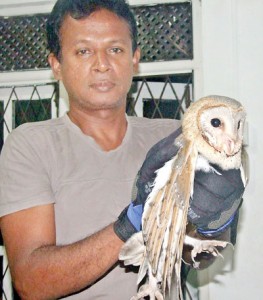
Environment lawyer, Jagath Gunawardane, who is also an expert on birds, stressed that unlike other rare birds of Sri Lanka, the barn owl is mostly found in old buildings in towns.
Another bird expert, Moditha Hiranya Kodikara Arachchi, shared an observation of a barn owl in Kandy inside the old Electricity Board building. “This barn owl was day-roosting on fans in the office without any trouble, until it was chased away because of droppings all over the office,” he said.
Experts fear that rat poison could harm these owls. According to the Barn Owl Trust, even a rodent eating a dose is not enough to kill it, and it may carry the poison in its liver for several months. So, before a poisoned rodent dies, the weakened rat may be caught by a barn owl, which then ingests the poison. Unfortunately, no research has been carried out on the effects of sub-lethal doses on wild barn owls.
“There could be a viable population of barn owls throughout Colombo and many other urban areas. It is an iconic bird in our urban settings,” said veteran ornithologist, Prof Sarath Kotagama.
He is inviting the public to share their barn owl sightings in Colombo and suburbs. Note the date and location by email:[email protected] or call 071- 8440144.

Kataragama crocs haunt sacred river
Fears of attacks by crocodiles in the Menik Ganga are keeping away devotees and locals, and wildlife officials say capturing and relocation is a challenge.
Wildlife officials and authorities of the Kataragama Devalaya have received complaints that about 20 crocodiles have been spotted in the river.
The officials of the Department of the Wildlife Conversation said only aggressive crocodiles are relocated during the festival season in August.
An official said there are no plans at the moment to trap and relocate the reptiles and that only some staff in the eveterinary division have the skills to capture crocodiles.
“We have only two or three [metal] cages. After we set the bait, we have to wait for days,” the official said.
But he also said these predators are needed in the river to help maintain the balance in the ecosystem. Besides, removing a dominant crocodile could backfire. The next largest crocodile could kill humans and other crocodiles, while driving most crocodiles into water channels near human populations.
A spokesman for the Kataragama Devale said that at religious festival times crocodiles have been removed with the assistance of wildlife officials.
About 15 crocodiles were removed last August during the Esala perahera.
“Twenty crocodiles have been seen,” he said.
He also said craters on the riverbed had been filled to eliminate hiding places.
The administrative officer of a home for the elderly in Kataragama, Indunil Galappaththi, said residents living near the temple fear to step into the river.
He claimed there have been attacks on humans in previous years. Some have lost limbs.
Resident, U. K. Bandara, said he had asked the regional wildlife office to remove the crocodiles or erect fenced bathing areas. “The crocodiles stay near all the bathing areas including the bank where the water- cutting festival is held.” Some crocodiles have been seen crawling into the villages, and ponds and tanks, he added.
Source – 16/04/2017, The Sunday times, see more at – http://www.sundaytimes.lk/170416/news/kataragama-crocs-haunt-sacred-river-237098.html
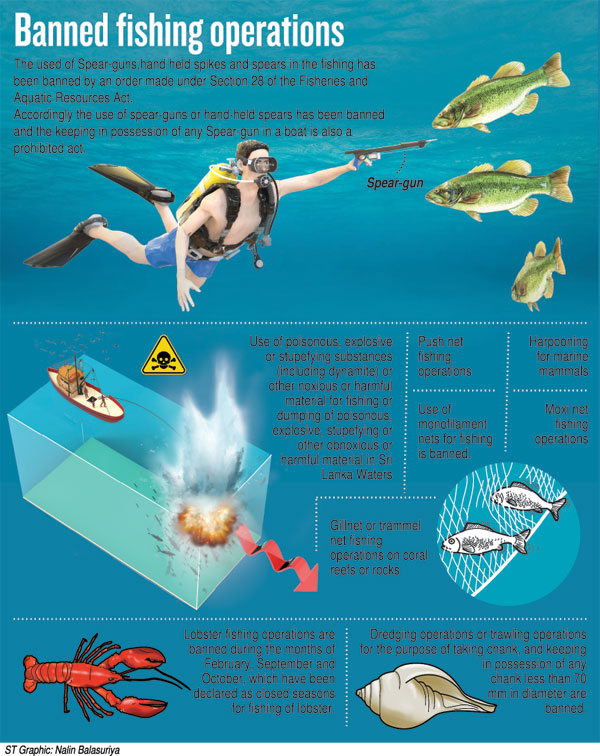
Incentives for dugong hunters to abandon illegal killings abandon illegal killings
Two people who were arrested while transporting 80 kilos of dugong flesh in a three-wheeler have been released on bail by a court.
There were detained on Sunday, April 9, by the navy at Thavulpadu in Mannar and handed over to to regional officers of Department of Wildlife Conservation. They were then produced in court and released on surety bail of Rs.100,000 each.
The DWC unit in Mannar is investigating, according to Channa Suraweera who is overseeing its marine unit.
Dugongs recorded in the Gulf of Mannar and Palk Bay in Sri Lanka continue to be hunted for meat and are now believed to be ‘critically endangered’ locally. Killing a dugong or the possession of its meat was banned in 1970s.
Dugongs are often killed when entangled in fishing nets as well as through dynamite fishing.
Despite the laws, the killing continues.
Marine activists say innovative methods are needed to discourage fishermen from killing dugongs.
A trial is underway in Kalpitiya, Puttalam and other areas where dugongs are found.
The project aims to give financial aid to the fishermen to replace illegal fishing gear.
“We have replaced about 30 illegal nets in Sottupitiya area in Kalpitiya. An agreement was also signed with fishermen not to resort to illegal methods,” said Thushan Kapurusinghe of the Sri Lanka Turtle Conservation Project, which is implementing the initiative.
The project is also helping fishermen to set up crab cages and sea bass cages in the shallow waters, Mr Kapurusinghe said.
There is high demand for sea bass, also known as moda. The baby fish are being fattened in metal cages set up in shallow seas. Lagoon crabs, too, are being raised this way.
“Raising sea bass is profitable. So this is an added income for us,” said Mr Priyantha, a local fishermen who plans to set up a sea bass cage in Kalpitiya.
The project is part of an international effort across the dugong range. It is an incentive-based approach to dugong and seagrass conservation. It is funded and managed by the Global Environment Facility and UN Environment.
The project, which ends in April, is also supporting alternative livelihoods for fishing communities including batik, sewing, dried fish packaging, coir mat production, and ornamental fish breeding.
During a recent media visit, we got a chance to meet a fishing community in Serakkuliya in Kalpitiya.
K B Nilmini, who has taken up sewing, together with a group of housewives said she can earn a decent living. “Our men used nylon nets to catch more fish. It is not legal, but that was a way to earn enough money. But, now, as I can support the family with the income from sewing clothes, we can abandon illegal fishing,” Ms Nilmini said.
But the numbers engaged in illegal fishing is large and they need to be persuaded to give up the practice.
Source – 16/04/2017,The Sunday Times, See more at – http://www.sundaytimes.lk/170416/news/incentives-for-dugong-hunters-to-abandon-illegal-killings-abandon-illegal-killings-237146.html
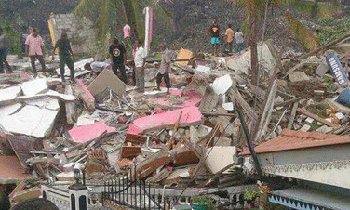
No more garbage will be dumped at Meethotamulla
The government today said that no more garbage will be dumped at the Meethotamulla site, where at least 17 persons were killed following the collapse of a part of the garbage mountain yesterday.
Deputy Foreign Affairs Minister Dr. Harsha de Silva said that the government has identified two temporary sites to dump garbage. “No more garbage will be dumped at this site and two temporary sites were identified this morning,” Dr. Silva said in a facebook status. He also revealed that the State will bear all funeral expenses of the people who lost their lives and immediately begin evacuations of those who are under any threat.
“It’s ironic that it was only a few weeks back that agreements were signed to begin waste to energy projects to finally deal with this perennial issue,” he said. However, he said that it’s unfortunate that even though payments had been made for those families under risk of landslides to move out, some had not done so.
They had even been advised to leave as recently as two days ago. On the instructions of President Maithripala Sirisena and Prime Minister Ranil Wickremesinghe, a coordination committee to management of the situation was established this morning. Ministers Susil Premjayantha, Patali Champika Ranawaka, A H M Fowzie, Dr Harsha de Silva, Sagala Ratnayake, Mohan Lal Grero, MPs S M Marikar and Mujibur Rahman, Army Commander and the IGP and all relevant government officials were present at a meeting held today in this regard. Major General Sudantha Ranasinghe has been appointed as in charge of search and rescue operations.
An area of about 150m by 75m is being carefully cleared up during operations. Already, about a hundred people have been shifted into temporarily holding locations such as schools. Others will also be shifted as well. The Prime Minister has ordered the release of all necessary funds from the Treasury to deal with all financial requirements, Dr. Silva added.
Source – 15/04/2017, Dailymirror, See more at: http://www.dailymirror.lk/article/No-more-garbage-will-be-dumped-at-Meethotamulla-Govt–127246.html#sthash.4w5kYJfE.dpuf
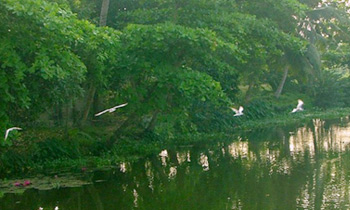
Attidiya birds fly away
The large scale sewerage dumping in the Attidiya canal along the Lake road during the past two weeks, polluting the Attidiya Lake, has resulted in the disappearance of many bird species from the area, residents complain.
Attidiya wetlands were declared a bird Sanctuary in 1990. The unbearable stench in the highly residential area is posing a major health hazard too, the residents point out. No action has been taken by the authorities regarding the matter so far.
Source – 16/04/2017, Dailymirror, See more at: http://www.dailymirror.lk/article/Attidiya-birds-fly-away-127256.html#sthash.jy2pYSoa.dpuf
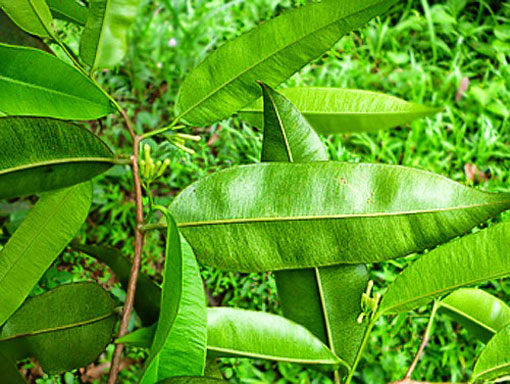
Suspect fined for attempting to transport Wallapatta
Customs Officials based at the Katunayake airport (BIA) have arrested a man for attempting to illegally transport an endangered plant species known as Wallapatta.
The Deputy Director of Customs at BIA, Parakrama Basnayaka stated that the individual was believed to have been travelling to Chennai.
The 25 kilograms of Wallapatta under the possession of the individual have been taken into police custody.
Basnayaka added that the perpetrator has been fined Rs.100,000 and the stock has been claimed as government property.
Source 06/04/2017, Ada Derana, See more at: http://www.adaderana.lk/news/40027/suspect-fined-for-attempting-to-transport-wallapatta#sthash.dqsTHeKP.dpuf













